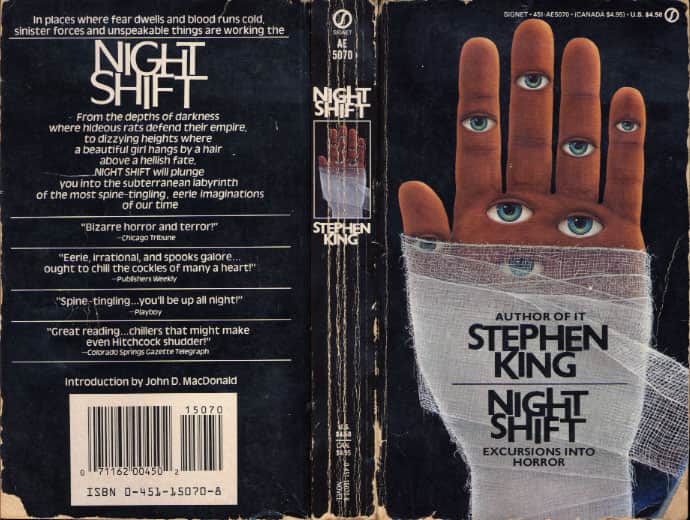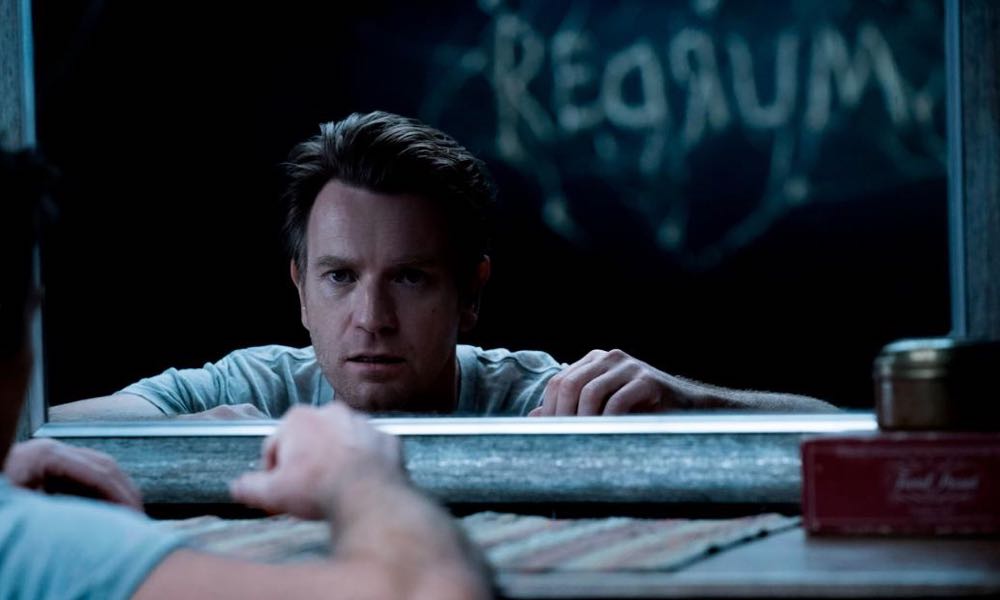Time is a flat circle, right?
It means what we seek cannot be delivered in this life. But what if it could? What if we can exist in a world where there are more projects like Gerald’s Game than there are like The Mangler? Less Children of the Corn. More children of the Loser’s Club.
As a lifelong Stephen King reader who has enjoyed the valleys as much as the peaks here are a few ways to keep this train rolling in the right direction:
1: Don’t be precious with the source material.
The page is the page is the page is the page
There has never been an instance where a book or comic book’s pages forever changed based on an adaptation. The source material remains forever and even though an author may release a modified version to cash in, each incarnation of a story has its own life. It has also been proven that being devoutly faithful to source material can be a huge mistake. What works in our mind’s eye as we read does not translate to the screen, but when someone really finds the heart of the source and spins new magic with it, classics are born. Stephen King is brilliant, but he has flaws.
Adaptations can shine a spotlight on those flaws or polish them to clarity. The source material is a foundation. Nothing more. There have been multiple versions of The Shining but only one that anyone not named Stephen King or Steven Weber cares about. But there could be a third attempt that takes the material someplace exciting. Nothing should be too sacred.
2: Find a Feige.
Ownership is everything
Robert Downey, Jr. isn’t the reason Marvel and Disney have created the ultimate ATM machine. Nor are the Russo brothers. Nor is the majestic Sean Gunn. It’s Kevin Feige, juggler of worlds and caretaker of the Infinity Gauntlet. J.J. Abrams isn’t the reason Star Wars has lost some of its sheen. It’s not even the whipping girl Kathleen Kennedy. It’s the ABSENCE of that epicenter force holding it all together and not letting outside influence corrupt. George Lucas went off his creative rocker in 1996 never to return, but he certainly did what he wanted without bending. Stephen King’s universe needs that. There needs to be a gatekeeper who rules with an iron fist.
And that person is not King himself. He’s great at writing and trolling presidents but he isn’t the kind of person who wants to or could square off against agents, executives, and marketing people who share half a collective brain when it comes to material.
3: Creators First.
Everything else is irrelevant
Nothing against Mick Garris, but look at how Stephen King entered the cinematic world: DePalma. Carpenter. Kubrick. Hooper. Cronenberg. Reiner. Those are heavy hitters. Until Frank Darabont brought balance to the force there was a B-movie stink associates with King onscreen. It was a well-earned stink.
The horror genre is wonderful but also the genre most loaded with trash. Much of King’s work in the short form isn’t baked enough to warrant a feature. In the hands of lesser talents it can be unbearable. Even the stronger material needs a deft touch to be executed. Hearts in Atlantis is a wonderful and heartfelt book. The film is merely good when it should be great.
In a world where there are very few new IP’s of value and even more in the genre that are successful but unspectacular (The Purge, Glass, and Us for example), Stephen King’s properties have a built-in audience but plenty of room for interpretation. A perfect bedrock to attach unique and diverse talents. Let them have their way with the material and at the worst the finished films will be ambitious failures but always interesting. The current King protector is Mike Flanagan and while he isn’t as majestic as Kubrick or Carpenter he’s certainly the right cocktail of talent and drive.
Actually a little against Mick Garris. Love the guy, but he’s not up to the task.
4: Use the connective tissue.
King did the heavy lifting already
King’s work is loaded with connections and layers of shared material. While much of it stems from the dense The Dark Tower series, it gives each project an opportunity to tie things together. Even if it’s just for the eagle-eyed. Not streets named after characters or winks, but actual material that bonds the universe. HULU’s Castle Rock has done this, but it’s too small a pond to make ripples. Because King’s film and television projects are all created under separate deals across studios and networks it’s impossible to wish for them to have a Marvel-esque synergy, there still is plenty of room in the margins to strengthen the connective tissue. It makes each King adaptation that much more relevant knowing they share a universal reality.
5: The Stand is everything.
In the beginning there was The Walking Dude
It’s difficult to expect too much from Josh Boone’s CBS adaptation of Stephen King’s finest work. Something doesn’t seem to fit. The biggest strike against Mick Garris’s attempt was a lack of budget. This incarnation seems to be a little more well-heeled but a hair under the “Appointment Television” status befitting the material. If Boone pulls it off, the center should hold for this King renaissance.
Regardless, The Stand is the Big One. It’s the Holy Grail of King projects. If this faces any budget cuts or interference it may be best to allow it to lie dormant until some network or studio treats it right. Make no mistake, though. This is the only one that really matters when it comes to lifelong King readers. A great telling of this story on celluloid solidifies the legacy.
6: Use the name.
Hell, abuse the name
The Shawshank Redemption and The Green Mile were marketed around the talent involved and Stephen King’s name was an afterthought. It’s surprising they didn’t tell people not to be afraid that Stephen King wrote the source material because the films were so not what the general public expected of Maine’s finest resident. Fans of the author will agree that his work is so eternal because of the humanity he brings to it. It’s not the horror that holds it all together but the multi-dimensional characters being affected by the horrific. It’s King’s superpower.
As a result, his name should be front and center. Like the Marvel logo. A seal that tells the audience “this will be good for you”. Something to provide a blanket of security that tells the viewer it may involve ghosts or haunted hotels or reanimated pets, but that it’s built on really strong bones.
It’s too much to ask for a Kingverse shingle for it all to live under, but as society becomes more knee-jerk and illiterate, even the real primordials among us know that Stephen King is a behemoth.
7: No More Dollar Babies
It was cute until everyone became a filmmaker
It was cute for a while, the idea of Stephen King optioning his works for a dollar so anyone with the right approach could take a swing. The cost of doing business needs to be a lot higher. Everyone with a credit card and a computer thinks they’re a filmmaker. The reality is that as generous as King can be, he’ll never escape that weakest link in the chain jeopardizing the whole lot.
8: Ride the anthology train.
King is the master of the form already
Castle Rock is nifty. That’s the best compliment that can be mustered. It’s a slow burn that requires patience. It’s not a slam dunk and it’s safe to assume its future is limited unless there’s a massive uptick in quality and watchability. The addition of Lizzie Caplan as Annie Wilkes is a start. Nifty doesn’t cut it.
Strip aside the top tier King works and the real meat lies in short fiction. The anthology format is hardwired to King, partially due to his youth enjoying the golden era of short fiction and the fact that he knows when he has an idea not worthy of a novel but too wicked to keep bottled up. With anthologies being a safe venture again (within reason), it’s time to unload. The Creepshow series is on the way with a few choice nuggets, but with a drastically streamlined budget there’s a chance the show could suffer. This is also a new era of hair triggers as legitimate shows like DC’s Swamp Thing isn’t given a chance to flourish.
The more anthology opportunities for King’s work, the better. Streaming. Theatrical. Network. Cable. Whatever. Just as long as there’s momentum. With King’s ability to churn out material it’s likely he’ll unload a few more corkers before his time on this planet is up.
9: Screw the box office.
This is about legacy
There are too many stories of box office or ratings failures that endure the test of time and have found ways to repay their creators and investors. Financial gain is just one component of success and not the most important. Netflix can carry loss leaders in its portfolio because there are millions of lunkheads who will stream the next Adam Sandler abomination. Making a Murderer has allowed for a few great and a whole mess of awful true crime documentaries because the audience out there is ravenous. The same goes for the cinema. IT sucked up so much dough, Warner Bros. was able to take a few risks and it allowed for them to double down on Chapter Two. That’s an exception with King’s cinematic endeavors. Even the great ones aren’t gigantic cash cows. King’s work lives in a world both mainstream and underdog. For endurance to reign there will have to be a long leash on the purse strings for a good while.
10: Pay attention to Doctor Sleep.
Reality is in the margins
It’s a brilliant move for director Mike Flanagan to pay his respects to both King and Kubrick with his sequel to The Shining. In fact, his film seems to be more hardwired to the classic novel and film than King’s book was. That’s very acute. Kubrick’s film is the definitive vision for that story to most even though King’s book is a masterpiece. Flanagan is setting a nice precedent for all the previous work in the canon to have a residual life. It also reminds us that it doesn’t matter if Stephen King loves the adaptation. It matters if the adaptation brings something new to the table.
Most of the above text is built on a foundation of dreams and wishful thinking. Hollywood isn’t run by horror readers who care about delivering the genre’s most successful author his due onscreen. It is run by bean counters who make decisions out of fear of losing their job or being held accountable.
But as far as little guideposts that could help, they could be worse.
Discuss this on our message boards.
Listen to our Movie Microscope for the Pet Sematary remake:










